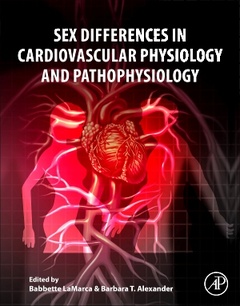Sex Differences in Cardiovascular Physiology and Pathophysiology
Coordonnateurs : LaMarca Babbette, Alexander Barbara T.

Sex Differences in Cardiovascular Physiology and Pathophysiology is a comprehensive look into the often overlooked and underappreciated fundamental sex differences between men and women and how those differences affect the cardiovascular system. It covers cardiovascular function, anatomy, cell signaling and the development of pathology. With contributions from world-renowned research investigators, this up-to-date reference compiles critical knowledge on cardiovascular sex differences, providing researchers and clinicians with a better understanding of the diagnosis, prevention and treatment of cardiovascular diseases in both men and women.
Sex Steroid Receptors 1. Androgens, women and cardiovascular disease 2. Estrogen receptor signaling and cardiovascular function 3. The Protective Role of Estrogen and Brain Estrogen Receptors in the Pathogenesis of Hypertension 4. Sex differences in cerebral ischemia
Sex differences in Hypertension 5. Sex differences in the central control of sodium appetite and blood pressure 6. Sex differences in the role of the ATt2 receptor and blood pressure 7. Regulation of Postmenopausal Hypertension
Preeclampsia and longterm consequences 8. Preeclampsia spectrum disorders including PE, E, HELLP, GH and CHTN 9. Preeclampsia: cardiovascular and renal risk during and post pregnancy 10. The Cerebral circulation during pregnancy and preeclampsia
Role of Sex and Atherosclerosis 11. Sex differences and the role of the renin angiotensin system in atherosclerosis and abdominal aortic aneurysms 12. Sex Differences in Coronary Artery Disease
Role of Sex difference in autoimmunity and inflammation 13. Role of Sex Differences in autoimmunity and inflammation 14. Estrogen autoimmunity and Lupus 15. Gender and sex differences in autoimmune type-I diabetes
Sex Differences in Cardiac Function and Remodeling 16. Sex differences in the developmental programming of cardiovascular structure and function 17. Sex specific mechanisms of myocardial hypertrophy and heart failure
Sex steroids and cardiovascular disease, men versus women 18. Benefits and Risks of Testosterone Therapy in Men with Testosterone Deficiency 19. Sex, age and neurovascular control
Researchers, postdoctoral fellows, clinicians (particularly cardiologists, vascular surgeons, etc.), clinical fellows, and graduate students.
Dr. Barbara T. Alexander, Ph.D., FAHA, FAPS, Professor of Physiology and Biophysics at the University of Mississippi Medical Center (UMMC) in Jackson M
- Identifies the fundamental sex differences in the physiology and pathophysiology of the cardiovascular system
- Describes cell signaling pathways involved in sex-associated cardiovascular function and diseases
- Puts the sex differences in cardiovascular diseases in the forefront to improve cardiovascular prognoses
Date de parution : 04-2019
Ouvrage de 392 p.
21.4x27.6 cm
Thèmes de Sex Differences in Cardiovascular Physiology and... :
Mots-clés :
Abdominal aortic aneurysms; Acute coronary syndrome; Androgen receptor; Androgens; Anemia; Angiotensin; Atherosclerosis; Autoimmune disease; Autoimmune diseases; Autoimmunity; Autonomic nervous system; B-cells; Blood pressure; Bone mineral density; Brain estrogen receptor subtypes; Cardiac embolism; Cardiac output; Cardiovascular disease; Cardiovascular risk factors; Cerebral autoregulation; Cerebral circulation; Cerebral ischemia; Cerebrovascular disease; Chronic hypertension; Chronic kidney disease; Circumventricular organs; CNS sympathetic neural network; Coronary artery disease; Depressive symptoms; Developmental Origins of Health and Disease; Developmental Programming; Eclampsia; Endothelial function; End-stage renal disease; Energy metabolism; Estradiol; Estrogen; Estrogen receptors; Estrogens; Female; Fetus; Fibrosis; Gender differences; Gestational hypertension; Heart; Heart failure; HELLP syndrome; Hormone replacement therapy; Hypertension; Hypogonadism; Hypothalamus; Inflammation; iNKT cells; Intracranial hemorrhage; Ischemic stroke; Islet-specific autoantibodies; Kidney; Lupus; Lupus pregnancy; Lymphocytes; Macrophages; Menopause; Menstrual cycle; Metabolic syndrome; Mineralocorticoids; Mitochondria; Mortality; Myocardial infarction; Neuroinflammation; NOD mice; Nonobstructive coronary disease; Obesity; Outcomes; Oxytocin; Plasticity; Polycystic ovary syndrome; Postmenopausal hypertension; Preeclampsia; Preeclampsia/eclampsia; Pregnancy; PRES; Protective actions of estrogen in the brain; Quality of life; Renin-angiotensin system; Renin-angiotensin-aldosterone system; Risk factors; Salt appetite; Sensitization of the hypertensive response; Sex chromosomes; Sex differences; Sex differences and hypertension; Sex hormones; Sexual dimorphism; Sexual function; Stress; Stroke; Systemic lupus erythematosus; T-cells; Testosterone deficiency; Testosterone therapy; Tregs; Type 1 diabetes; Vascular; Vascular dysfunction; Vasculature; Vasoconstriction; Women



